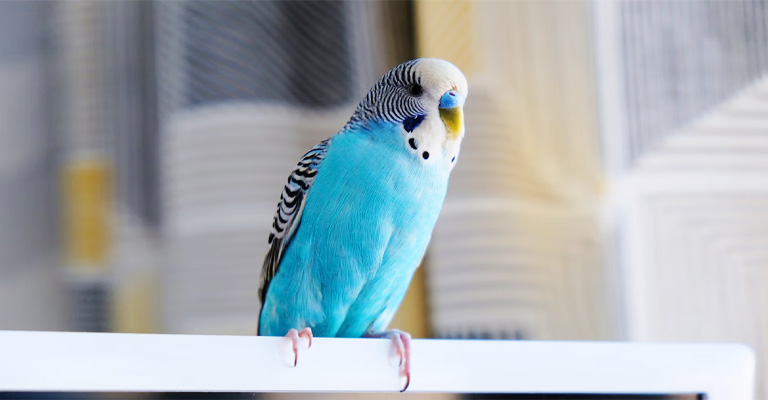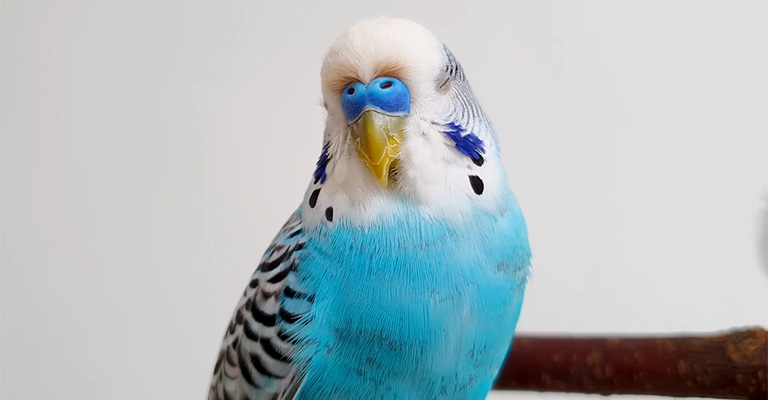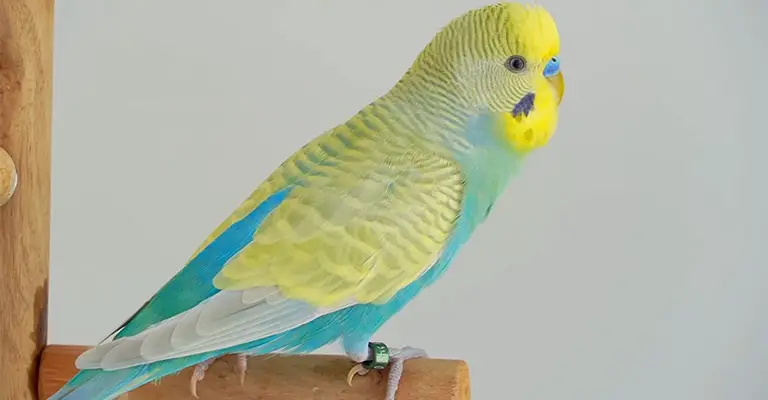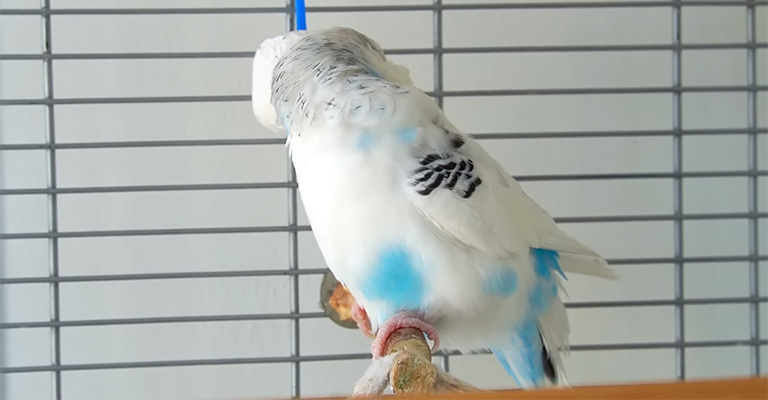As an English budgie owner, you may occasionally notice peculiar behavior in your feathered friend. One puzzling action that might leave you scratching your head is when your English budgie keeps facing the wall.
If you’re wondering why my English Budgie keeps facing the wall, here’s your answer. While it can be perplexing at first, there are various reasons behind this behavior.
In this article, we will explore the potential causes and shed light on why your English budgie may exhibit this wall-facing tendency.

Why Does My English Budgie Keep Facing the Wall?
There could be several reasons why your English budgie is facing the wall. Here are a few possibilities:
Nesting Behavior
Budgies have a natural instinct to seek out enclosed spaces for nesting. Facing the wall could be a sign that your budgie is trying to create a sense of security and privacy.
Fear or Stress
Budgies may face the wall if they feel threatened or stressed. It could be due to a change in their environment, such as a new pet, loud noises, or a disruption to their usual routine. They might perceive the wall as a barrier that provides some sense of protection.
Illness or Discomfort

Facing the wall could be an indication that your budgie is feeling unwell. Birds often try to hide their symptoms when they’re sick, and facing the wall may be a way for them to retreat and conserve energy.
Boredom or Lack of Stimulation
Budgies are intelligent and social creatures that require mental and physical stimulation. If your budgie is not getting enough attention, interaction, or environmental enrichment, they may face the wall out of boredom or frustration.
Habit or Preference
Sometimes, birds develop specific habits or preferences for certain spots or positions. It could be that your budgie finds comfort or enjoyment in facing the wall, and it has become their preferred spot.
Seeking Security
Facing the wall can be an instinctive behavior for budgies, including English budgies. It provides them with a sense of security, as they are minimizing exposure to potential threats from the surrounding environment. By positioning themselves towards a wall, they can create a perceived barrier that helps them feel safe and protected.
Privacy and Relaxation
Budgies, by nature, seek moments of solitude and relaxation. Facing the wall may serve as a way for your English budgie to find a secluded space where they can unwind and rest.
It’s similar to humans seeking a quiet corner or a cozy nook for relaxation. The wall offers a sense of seclusion and tranquility, allowing them to recharge and rejuvenate.
Temperature Regulation
Budgies are highly sensitive to temperature fluctuations. Facing the wall can be their way of regulating body temperature. By positioning themselves towards the wall, they can minimize exposure to drafts or cold air from certain directions.
Similarly, during warmer periods, facing the wall might help them avoid direct sunlight or heat sources, ensuring they stay comfortable.
Visual Stimulation
English budgies are known for their keen interest in observing their surroundings. Facing the wall might provide them with a unique visual perspective.
They may find the textures, patterns, or shadows on the wall intriguing or entertaining. It offers them an alternative view from their usual vantage point, adding variety to their visual stimulation.
Environmental Factors
Sometimes, a budgie’s behavior can be influenced by changes or disturbances in its environment. If there have been recent changes in the room, such as new furniture placement, rearranged objects, or even external noises, your budgie may choose to face the wall to minimize exposure to potential disruptions or unfamiliar stimuli.
To determine the exact reason for your budgie’s behavior, it’s essential to observe its overall behavior, health, and living conditions.
If you notice any other signs of illness, such as changes in appetite, drooping feathers, or decreased activity, it’s advisable to consult with a veterinarian who specializes in avian care.
Additionally, ensure that your budgie has a stimulating environment with plenty of toys, social interaction, and opportunities for exercise to help alleviate boredom or stress.
Should You Be Concerned?

If your budgie is only occasionally facing the wall and appears otherwise healthy and active, there may not be an immediate cause for concern. However, if you notice any of the following signs, it’s advisable to take them seriously and consult with a veterinarian:
Loss of Appetite or Weight Loss
A decrease in appetite or noticeable weight loss can indicate underlying health issues and should be evaluated by a professional.
Lethargy or Decreased Activity
If your budgie is spending excessive amounts of time facing the wall and is generally less active than usual, it could be a sign of illness or distress.
Abnormal Droppings
Changes in the color, consistency, or frequency of droppings can indicate digestive problems or other health issues.
Respiratory Problems
Labored breathing, wheezing, sneezing, or nasal discharge may indicate respiratory infections or other respiratory issues that require veterinary attention.
Changes In Appearance or Feather Condition
Matted, disheveled feathers, bald patches, or changes in coloration can be signs of underlying health problems.
Behavior Changes
If your budgie’s behavior has significantly changed, such as increased aggression, excessive vocalization, or withdrawal from social interaction, it’s worth investigating.
Remember, as the owner, you are the best judge of your budgie’s usual behavior and patterns. Trust your instincts and seek veterinary advice if you have concerns about your budgie’s well-being.
It’s better to err on the side of caution and have a professional evaluate your budgie to ensure its health and happiness.
What Should You Do If Your English Budgie Faces the Wall?

If your English budgie is consistently facing the wall, there are several steps you can take:
Assess the Environment
Make sure there are no potential stressors or sources of fear near the wall. Check for loud noises, drafts, or anything that might be causing your English budgie to feel uneasy.
Provide a Stimulating Environment
English budgies are intelligent birds and require mental and physical stimulation. Ensure that your English budgie has plenty of toys, perches, and activities to keep it engaged and entertained. Rotate toys regularly to prevent boredom.
Offer Social Interaction
English budgies are social animals and thrive on companionship. Spend quality time with your English budgie, engaging in activities such as talking, whistling, singing, or gentle play. Consider getting another English budgie as a companion if your bird is lonely.
Check for Health Issues
Examine your English budgie for any signs of illness or discomfort. Look for changes in appetite, weight loss, abnormal droppings, feather abnormalities, or respiratory problems. If you notice any concerning symptoms, it’s best to consult a veterinarian experienced in avian care.
Arrange the Cage Layout
Consider rearranging the cage or adding perches and toys near the wall. This can provide your English budgie with alternative places to perch and explore, redirecting its attention away from the wall.
Observe and Monitor Behavior
Keep a close eye on your English budgie’s behavior over time. If the behavior persists or is accompanied by other signs of distress or illness, it’s crucial to consult a veterinarian for a professional evaluation.
Remember, each bird is unique, and their behavior can have different underlying causes. By providing a stimulating environment, and social interaction, and monitoring their health, you can help ensure your English budgie’s well-being.
If you remain concerned about your English budgie’s behavior, seeking advice from an avian veterinarian is always a good idea.
How to Understand Budgie Body Language?
Understanding budgie body language can help you interpret your pet bird’s feelings and intentions. Here are some key aspects to consider when deciphering budgie body language:
Feather Position
The positioning of a budgie’s feathers can indicate its mood. When relaxed and content, the feathers will be smooth and flat against the body. If the feathers are puffed up, it can mean the budgie is cold, scared, or feeling unwell.
Head Movements
Pay attention to your budgie’s head movements. If it is bobbing its head up and down, it may be a sign of curiosity or excitement. However, rapid head bobbing accompanied by dilated pupils might indicate fear or aggression.
Eye Behavior
Budgies use their eyes to communicate. Wide, alert eyes often show interest or curiosity. Narrowed or half-closed eyes can indicate relaxation or sleepiness. However, if the eyes are constantly pinning or dilating, it might be a sign of stress or unease.
Body Posture
Budgies exhibit different body postures to express their emotions. A relaxed budgie will have a balanced posture, standing evenly on both feet. If the budgie leans forward with feathers fluffed up, it might be feeling threatened or defensive.
Tail Movements
The movement of a budgie’s tail can reveal its emotional state. A tail held straight up often indicates alertness or excitement. A tail held low and relaxed suggests contentment. However, a rapidly wagging or twitching tail can signal agitation or annoyance.
FAQs
While it is not uncommon for English budgies to face the wall, doing so all the time may indicate a potential issue. Observe your budgie’s overall behavior, eating habits, and energy levels. If they appear healthy otherwise and engage in regular activities, it may be a personal preference.
Ensure that your budgie’s cage is placed in a quiet area with minimal foot traffic and away from potential stressors like loud noises or direct drafts. Offer hiding spots within the cage, such as covered perches or nesting boxes, where they can retreat when they feel the need for security.
It is not uncommon for budgies, including English budgies, to face the wall during the night when they are resting or sleeping. This behavior can be a way for them to feel secure and have a sense of privacy while they sleep. As long as their overall behavior and health are normal, there is usually no cause for concern.
You can try repositioning the cage or adding perches and toys in different areas of the cage to provide alternative viewpoints for your budgie. Additionally, ensure that the room where the cage is located has a variety of stimuli, such as windows with views of outdoor scenery or other bird feeders.
If your budgie’s wall-facing behavior is accompanied by changes in appetite, weight loss, excessive lethargy, feather plucking, or any other signs of illness, it is essential to seek veterinary advice. A qualified avian veterinarian can conduct a thorough examination and provide appropriate guidance or treatment if necessary.
Bottom Line
That was all about why does my English Budgie keep facing the wall. While it may appear peculiar or perplexing at first, your English budgie’s tendency to face the wall often stems from natural behaviors and instincts.
Whether seeking security, privacy, regulating temperature, or finding visual stimulation, their actions are often rooted in their innate avian nature. Understanding these motivations can help you create a comfortable and enriched environment for your English budgie.
However, if you notice any other concerning behaviors or significant changes in your budgie’s health or demeanor, it is always advisable to consult with a veterinarian specializing in avian care to ensure their well-being.